Magazine articles, January-July 2022
Using data to predict resilience in elite sports
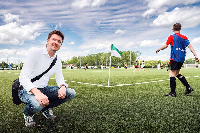
For elite athletes, timely physical and mental recovery from stressors plays a key role in performing well. Psychologist and sports researcher Ruud den Hartigh from the University of Groningen, together with his team, is using data to provide insights into and predictions on the resilience of individual athletes.
Read more
Successfully sharing knowledge through the public academies
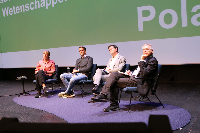
Polarization, cybercrime, personal injury, sustainable behaviour... These are just some topics of recent public academies. The themed lectures are one example of the many initiatives that have arisen over the past few years to spread knowledge and involve the public more in science. Why do researchers find this important?
Read more
The vulnerability of the ‘cappuccino city’
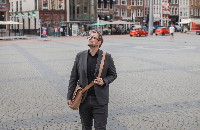
Deserted city centres, drained of all life by COVID-19 and lockdowns. Urban geographer Martin Boisen: ‘How can it be that some city centres are so deserted when there are no visitors? Tourism promotes liveliness, but it also has the power to quell all other forms of liveliness.’
How did this happen? And can we still turn the tide?
Read more
Culture? Ask young people
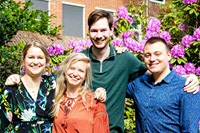
How do you involve young people in culture? This is a question that local governments and the cultural sector have struggled with for some time. At the request of the Municipality of Het Hogeland, University of Groningen students carefully considered the matter and have come up with an answer. The Cultural Engagement of Young Adults in Het Hogeland project by Faculty of Arts students Ydwer Hoekstra, Stefan Ivanov, Roos Gielen, and Joren Arkes recently won the Ben Feringa Impact Award in the student category. The jury report was very positive: ‘A beautiful and practical research project that goes further than scientific research alone. This is actually really useful to people.’
Read more
Everyone has a right to energy
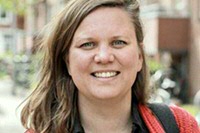
The current gas crisis and rising energy prices have made us acutely aware of the role that energy plays in our lives. For some, it means that they can no longer pay their energy bills. The combination of a low income, high energy costs, and a poorly insulated house often results in ‘energy poverty’. Why is there no universal right to energy? There is good reason to ask this question; in the Netherlands alone, more than 550,000 households live in energy poverty.
Read more
A happy life with a mental illness
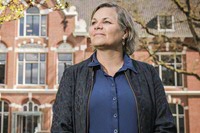
Stynke Castelein is dedicated to helping people with severe mental illnesses to regain their place in society and to give meaning to their lives. She and her team are researching new treatment methods for people with severe mental illnesses. Her motto? Let’s boost recovery!
Read more
Team Albatrozz builds revolutionary wind turbine after ‘Wallace & Gromit’ discovery by Stamhuis
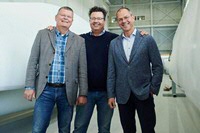
In his wind tunnel at Zernike Campus, Eize Stamhuis discovered the smart power of sea birds. But what could he do with the patent for promising wind turbine blades? An alliance with two pioneering entrepreneurs led to the Albatrozz start-up. From looking through a pair of binoculars on Heligoland to developing a spectacular wind turbine at Zeewolde and large-scale applications.
Read more
Ecologist Loonen to travel to ever-changing Spitsbergen for the thirty-fifth summer
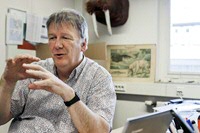
For the thirty-fifth year in a row, Maarten Loonen will be spending his summer on Spitsbergen. In July, he will also be leading a new polar expedition involving scientists, journalists, policymakers, and tourists. ‘It’s a great privilege to be able to get people engaged in the area and the research.’
Read more
Working towards personalized intelligent computers
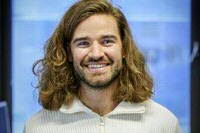
Computers are everywhere: in our pockets, in our offices and in our cars. Some are advanced in the field of artificial intelligence (‘AI’). Yet, we still don’t have walking-and-talking robots. At CogniGron, Steve Abreu is designing programming methods for neuromorphic computers. He describes why brains are more intelligent than computers.
Read more
Teaching Innovations: How podcasts help engage students
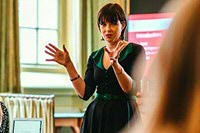
Dr. Erin Wilson, Dr. Tina Otten, Linde Draaisma and Henk van Putten are the winners of the first Best Practice in Teaching and Learning Award, the successor of the Teacher of the Year election. They won the prize for the innovative teaching methods they developed for their course The End of the World as We Know It? Climate Change, End Times and Sustainable Futures. Erin Wilson tells us about these methods and their prize winning course.
Read more
Eating for science
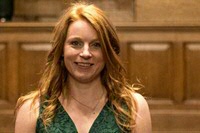
Symptoms such as headaches, stomach ache, stress, and fatigue can be a precursor for so-called 'diseases of affluence' and depression. But can you reduce the symptoms and prevent serious illness by changing your diet? Anouk Willems spent a month studying the effects of a vegetarian, gluten-free, low-carbohydrate, or high animal-based diet on a large group of test subjects.
Read more
The mayor should not be a sheriff
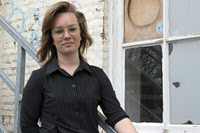
Jaws dropping in surprise – this is what legal expert Michelle Bruijn sees when she tells foreign legal experts about the Dutch approach to drugs crime. She herself also has serious misgivings regarding the policy adopted by many mayors. ‘They should not take on the role of “crime fighter” or “sheriff”.’
Read more
The vulnerability of LGBT people
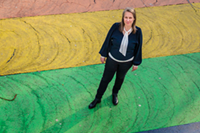
Why do sexuality and gender continue to be such sensitive topics within our society? Despite our liberal climate, members of the LGBT community face physical and mental health issues more often than others, even in the Netherlands. Laura Baams is looking into how this is possible.
Read more
How migration, families, and life courses are interrelated
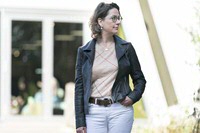
Helga de Valk has been interested in the life courses of young people ever since she was a student. Over the years. this interest extended to the interrelationship between migration, families, and life courses. Today, Helga de Valk is Professor of Migration and the Life Course and director of the Netherlands Interdisciplinary Demographic Institute (NIDI).
Read more
Teaching is a core activity'
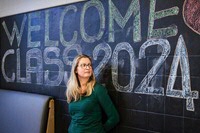
Inspiration and reflection for lectures; that is what the University of Groningen Education Festival wants to offer. Dr Marline Wilders, who is involved in the Teaching Academy Groningen (TAG), explains why educational innovation is so important.
Read more
Research into language disorders in children with brain tumours
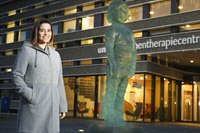
Young children with a brain tumour may develop a language disorder as a consequence of the tumour or the operation, or if the radiotherapy damages the brain. Vânia de Aguiar, clinical linguist and neurolinguist at the Faculty of Arts, is about to start research on the question of whether damage to specific parts of the brain increases the risk of language disorders.
Read more
The single-celled microworld of Tessa Quax
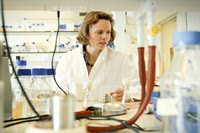
She receives prize after prize and grant after grant: lately, researcher and professor microbiology Tessa Quax has been making headlines. The biologist researches archaea, single-celled microorganisms that lack a cell nucleus and flourish in extreme circumstances. Her eye-opening research sheds new light on viruses, which also afflict archaea, but Quax does it all out of curiosity and for her own field. 'I just want to know how something works. There is no need to have a goal.'
Read more
'The impact of bombs last a long time'
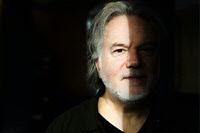
Van den Berg is very much enjoying himself in Groningen. But the coronavirus pandemic caused delay in furnishing his room. It is only a small inconvenienve for the econometrist. He knows very well how great an impact a pandemic or war can have on someone's wellbeing even decades after the event.
Read more
Rebecca Gomperts: 'Abortion is a human right'
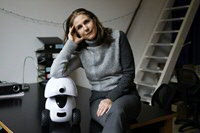
When Rebecca Gomperts is presented with the Aletta Jacobs Prize by Rector Magnificus Cicsa Wijmenga on 8 March, her thoughts will undoubtedly turn to previous recipients of the prize, such as Els Borst, Gunilla Kleiverda, and Khadija Arib. But at the forefront of her mind will be the women who still do not have access to a safe abortion.
Read more
Underwater wonderland
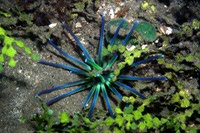
In November, coral researcher Bert Hoeksema from Naturalis Biodiversity Center gave his inaugural speech in Groningen as Honorary Professor of Tropical Marine Biodiversity. Discovering life on and around coral reefs is his passion. He then uses this knowledge to improve protection of the reefs. ‘You never know what you’re going to encounter below the surface. That’s what makes it so fascinating.’
Read more
Working on health and talent together with FC Groningen
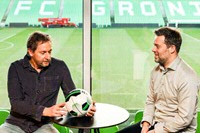
The University of Groningen (UG), the University Medical Center Groningen (UMCG), and Football Club (FC) Groningen have been working together in the field of sports and exercise for many years. Wouter Frencken (FC Groningen) and Koen Lemmink (UMCG/UG) discuss innovative and interdisciplinary projects that have resulted from this collaboration. They also talk about the societal impact that they want to generate, for example in the field of the general lack of physical activity, and the development and retention of talent in the region.
Read more
Genetic testing for better health
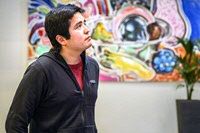
Healthy ageing, the prospect of living a healthy, prolonged life, can be considered one of the goals of healthcare in the 21 st century. For his PhD research, Taichi Ochi investigated how genetic testing can help individuals receive personalised treatment options in complex diseases, such as depression and diabetes.
Read more
Teaching pre-schoolers through VR goggles
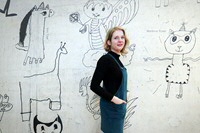
Teaching methods are continually being innovated and improved, including through virtual reality (VR). Jolien Mouw, assistant professor at the UG and educational scientist, is fully engaged in teaching innovation. According to her, simply teaching without thinking about ways to improve is a no-go.
Read more
Deafblind individuals enjoy 'sense stories'
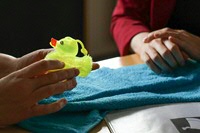
Communicating with deafblind individuals or deaf people who also have a cognitive disability is particularly difficult. The University of Groningen, together with Koninklijke Kentalis, is researching whether ‘sense stories’ – stories that can be told through smell or touch, for example – can help to improve such communication. The aim: to ensure that this group of people and their relatives can enjoy spending time on the same thing as one another. The research is still being carried out, yet the initial responses appear to be positive.
Read more
Talking differently about feminism
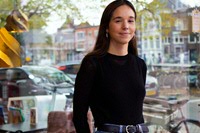
As a PhD student involved in an interdisciplinary UG project, Ruby Schofield is conducting research on the concept of women’s empowerment at the faculties of Philosophy and Arts. Her research focuses on a shift in our concept of what empowerment is. Whereas the discourse around this topic used to focus primarily on women’s struggle for empowerment, these days, it is increasingly shifting to women who are already empowered. Unrightfully so, in Schofield’s opinion.
Read more
Plucking virtual flower petals
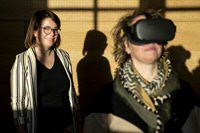
Intensive care (IC) medicine is getting better at keeping seriously ill people alive, but recovery after admission to the IC unit often takes months or even years. PhD student Lise Beumeler is researching which patients would benefit from an IC rehabilitation track and what such a track should look like. Together with the company 8D-games, she is researching how gaming, more specifically ‘serious gaming’, can help with this.
Read more
